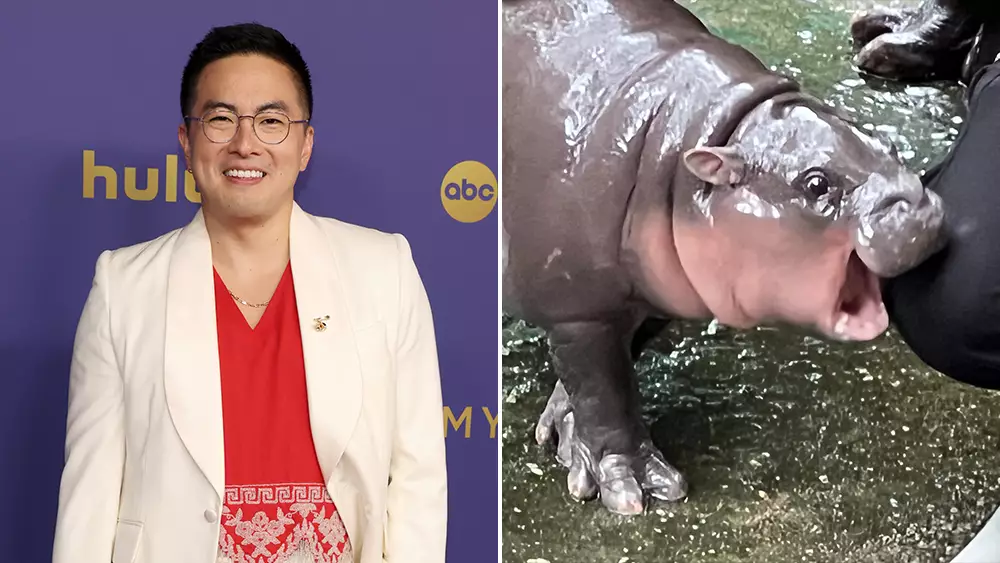The recent comedic portrayal of Moo Deng, a fictional pygmy hippopotamus, has sparked conversations that extend beyond mere humor. In a segment from the Season 50 premiere of “Saturday Night Live,” actor Bowen Yang donned an exaggerated purple hippo costume, injecting a mixture of satire and social critique into mainstream media. This satirical portrayal served as a metaphorical vehicle for discussing the boundaries of public persona and the treatment of performing individuals—both human and animal.
Yang’s performance tackled the issue of parasocial relationships, where audiences develop one-sided emotional bonds with public figures or animals devoid of reciprocal feelings. Moo Deng candidly stated, “Reminder: Women owe you nothing!” This line not only speaks to the broader societal concerns about expectations placed on women but also highlights the demand for respect within public interactions. Yang’s insistence on setting clear boundaries resonates especially in today’s hyper-connected society, where it is all too easy for admirers to lose sight of the inherent individuality of those they idolize, animals included.
The intention behind this character was not only to entertain but also to remind viewers that not all interactions are appropriate or welcome. Moo Deng emphasized that as a zoo animal in a performance, he was not obligated to meet the whims of onlookers who saw him merely as a spectacle. This juxtaposition of humor and critique draws attention to how society often conflates celebrity status with unfettered access to the figures they admire.
The concept of representation stands central in Yang’s commentary. In discussing hippo representation, Yang humorously noted that prior to Moo Deng, the only portrayal of hippos in popular culture revolved around children’s games or animated films. This highlights a gap in representation where characters, especially those from marginalized groups or non-human entities, are often caricatured or lack depth.
By introducing Moo Deng, Yang effectively creates a new narrative around hippos that challenges audiences to reconsider the significance of these creatures beyond mere entertainment. He playfully asserts, “I’m your favorite hippo’s favorite hippo.” This line not only solidifies a bond between the character and the audience but also elevates the hippo to a status of significance rather than triviality.
Furthermore, Yang’s appearance recalls the ongoing debate surrounding the treatment of celebrities, particularly those within the LGBTQ+ community, such as Chappell Roan. By weaving Roan’s experiences into the fabric of the Moo Deng character, Yang channels the essence of a broader societal issue: the harassment and mistreatment of individuals just because they are in the public sphere. Moo Deng’s refusal to endorse any political figures further emphasizes the need for animals, like public figures, to be recognized as individuals with autonomy, free from external pressures of advocacy.
The satirical landscape of “Weekend Update” extends beyond Yang’s portrayal. Another segment by Devon Walker lampoons New York City Mayor Eric Adams, showcasing the interplay between humor and criticism in political discourse. Walker’s exaggerated claims of turning New York City into a “swag-tropolis” served to underscore the absurdities of political life amid serious issues such as crime and public health crises.
In this context, Moo Deng and the parody of Mayor Adams serve as vessels for broader discussions on accountability, representation, and the absurdity that often plagues their respective platforms. While the hippo calls for justice and boundaries, the mayor’s flippant remarks reveal a disconnect between political leadership and the realities facing constituents.
Moo Deng’s viral fame encapsulates a poignant social commentary interwoven with humor. Bowen Yang’s performance serves as a microcosm of society’s expectations placed upon both fictional characters and actual individuals. Through this lens, audiences are encouraged to reflect on their relationships with public figures, the significance of representation, and the boundaries that must exist in every form of interaction. This blend of laughter and critique highlights the transformative power of comedy, allowing it to be both entertaining and enlightening, thereby reinforcing the need for empathy in a world that often forgets to pause and reflect.

